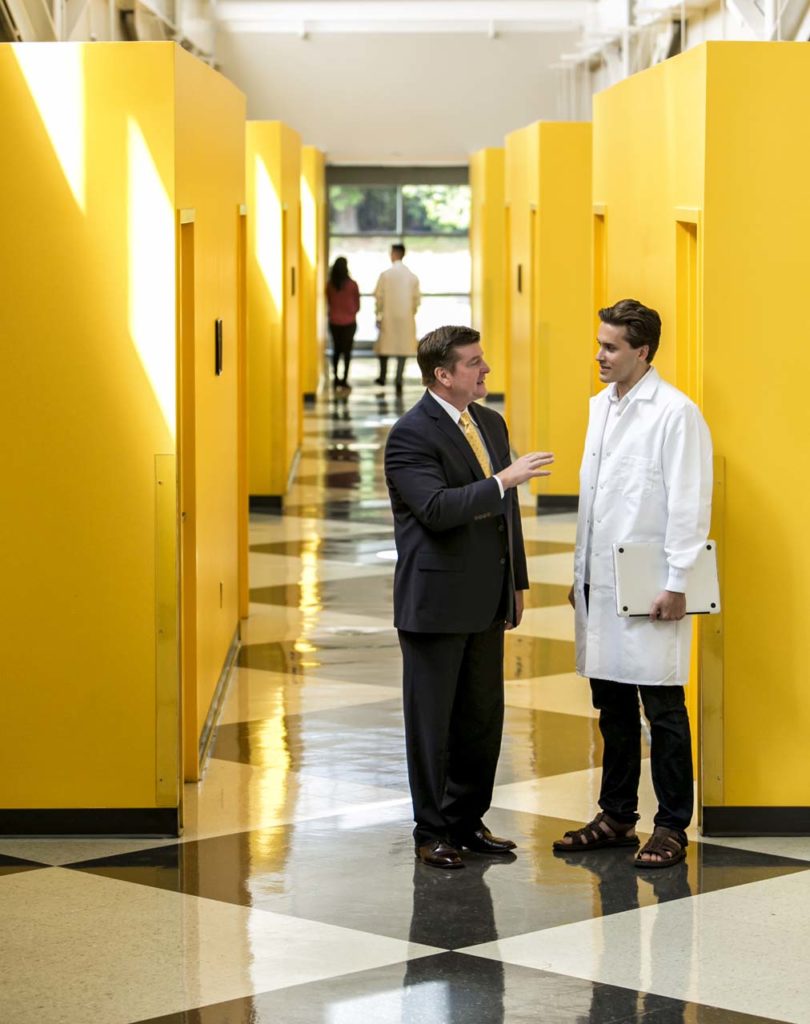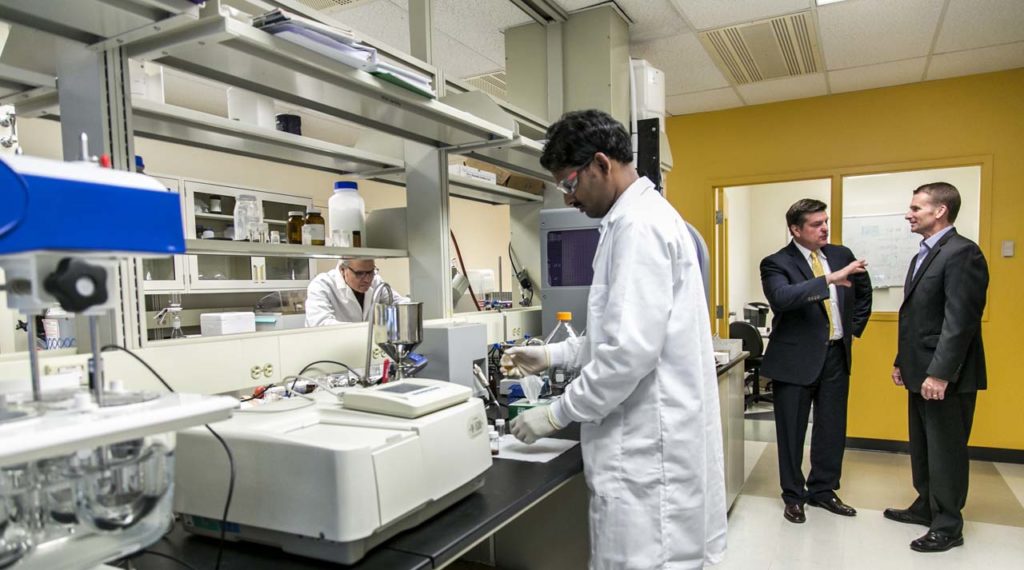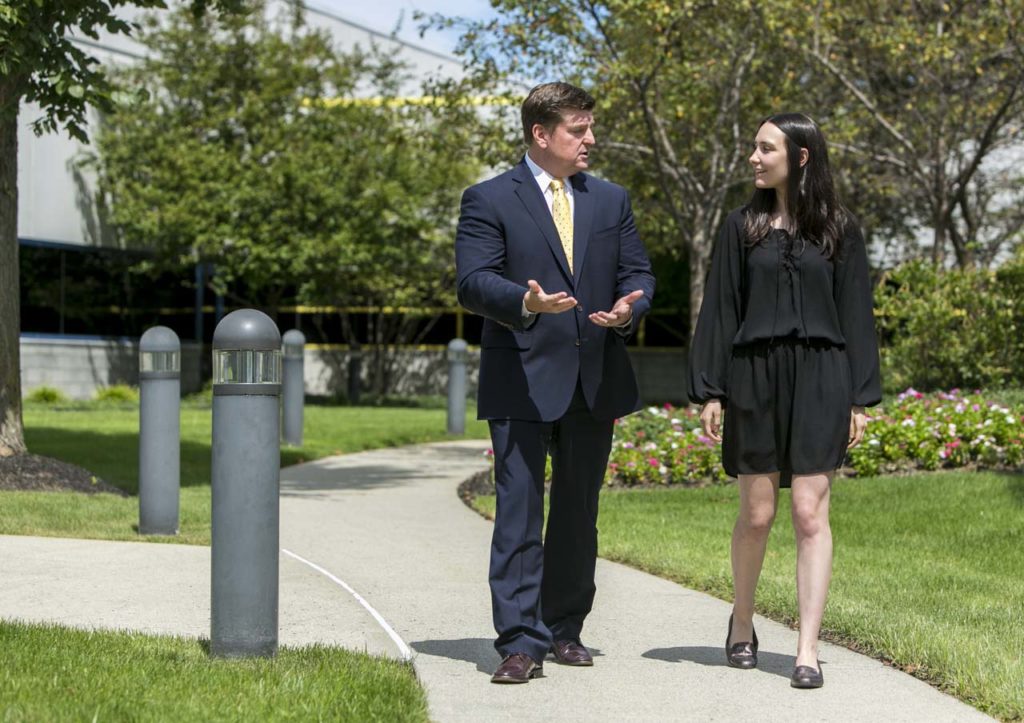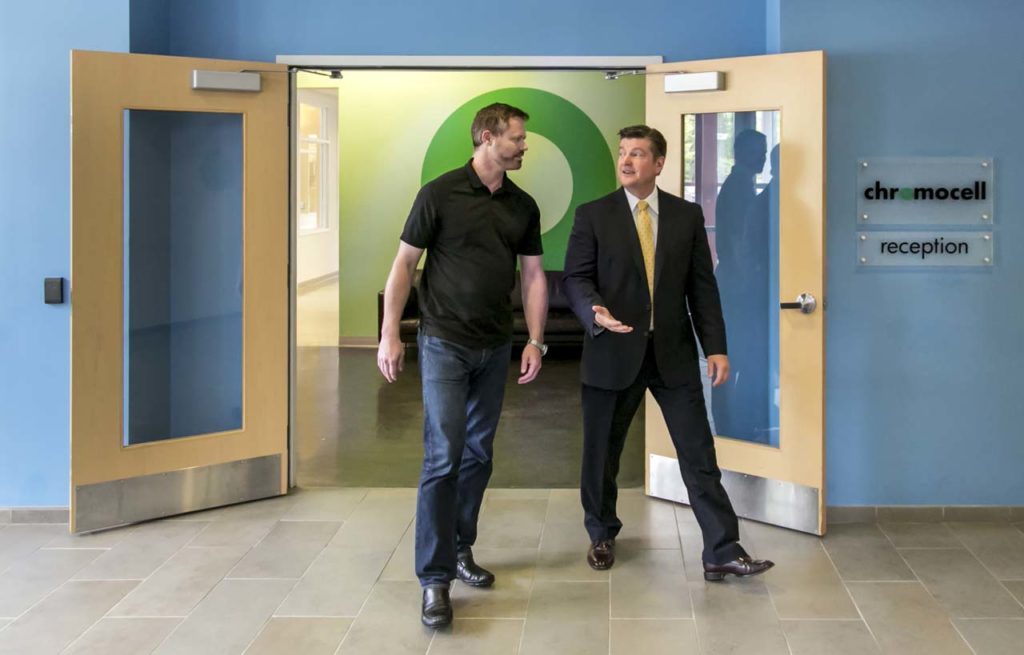this business guru works behind the scenes, where he’s known as One of the biggest players in New Jersey real estate
by Laura D.C. Kolnoski • Photos By Amessé Photography
Not everyone knows his name. But thousands of New Jersey residents have benefited from his work. Timothy J. “Tim” Lizura is president and chief operating officer of the New Jersey Economic Development Authority (EDA), an independent state agency that finances small and midsized businesses, administers tax incentives to retain and grow jobs, creates redevelopment initiatives, and supports entrepreneurial development through a variety of programs.
And that’s for starters.

Lizura, who has a BA in economics from Rutgers and an MBA in finance and real estate from the university’s Graduate School of Management, has played critical roles in New Jersey’s highest-profile development projects since joining the EDA in 1996. He also spent two years with the Port Authority of New York & New Jersey, laying the groundwork for the redevelopment of the World Trade Center site following 9/11.
The quintessential Jersey Boy, Lizura grew up in Piscataway, where he played trumpet and keyboards in the high school band. He briefly toyed with the idea of becoming a musician, “but I thought I needed to eat, so I followed my dad into business,” he said, adding, “I still play golf with my dad on weekends, and he still hits the ball better than I do.” His dad, Raymond Lizura, is a CPA with his own business headquartered in Greenbrook and Flemington.
Lizura was headed into accounting as well but “slid into economics and loved it; it’s a terrific way to train your mind. It’s a social science and my passion.” That passion was tested when he joined the Federal Deposit Insurance Corporation during the banking crisis of the 1990s. “My job was to close down failing banks,” he said. “I went in on a Friday and told staff they no longer had a job. My job today is infinitely better, because I get to create jobs.”

While working part-time on his MBA, he visited Rutgers’ Career Services office and spotted a thumb-tacked notice for an employment opportunity at the EDA. He applied, was hired in 1996, and began his ascent on the real estate development team, eventually becoming senior vice president of finance and development.
“The EDA is a founder and developer of properties,” Lizura explained. “You learn to manage properties and be part of a financial team.” Among his initial duties was securing public– private partnerships for the expansion of the Liberty Science Center in Jersey City. Within 10 years, he became EDA’s director. His first project in that role was overseeing the creation of the its flagship facility, The Technology Centre of New Jersey, located on Route 1 in North Brunswick. The 75-acre facility, which has 325,000 square feet of laboratory, production, and office space, is designed for R&D companies in biosciences, microelectronics, advanced materials, and communications technologies. The campus incubator—the Commercialization Center for Innovative Technologies—opened in 2005.
Lizura then received a call he could not refuse, a request that he join the Port Authority, the Silverstein Corporation, and the city and state of New York as director of the World Trade Center Redevelopment Department, leading the team tasked with rebuilding the World Trade Center site, including re-creating the Path Station and creating the 9/11 Memorial.

In 2006, he undertook executing multiple agreements and leases, and coordinated construction. By the end of his second year, work to construct Tower One was approved.
Then his phone rang again. This time, it was Caren Franzini, then CEO of the EDA. The authority was seeking a senior vice president, and it wanted Lizura back. Franzini, one of his mentors, passed away recently, as did another: Alfred C. Koeppe, former president of both Public Service Electric & Gas and New Jersey Bell.
“The World Trade Center was a terrific project to be a part of, but I wanted to get to a different conversation with a different skill set,” Lizura said. “The heavy lifting was over, and I was looking for a challenge closer to home.”
He was named president and COO of the EDA in 2012 and now oversees the state’s sales strategies and processes supporting business development, urban development, real estate sites, and the growth of the technology and life sciences industries. As part of those duties, he sits on the Fort Monmouth Economic Revitalization Authority, the public–private agency now successfully redeveloping the former U.S. Army base, which closed in 2005.
Working cooperatively with the governor’s office and legislators in crafting new legislation is also part of Lizura’s job description, as is providing loans, bonds, and incentives for the business community and setting strategic directives. The EDA oversees the Grow NJ program, through which businesses are awarded tax credits for each job they create or retain. The value of the tax credits is based on such factors as where the business locates, the number of jobs it creates or retains, the industry, its capital investment, and other circumstances. To qualify for the program, companies must locate in specific areas, such as in “distressed” municipalities or near urban mass transit hubs.
“We don’t give away anything,” Lizura said. “Incentives are based on what companies have done. We try to be impactful when a project is struggling, striving to find the right tool to help. When you peel back the onion, 60 to 70 percent of the EDA’s Grow NJ awards have gone to new industries that are performance-based. It creates incentives for investment. The state will be better off.”
Aid for businesses affected by Superstorm Sandy also came under Lizura’s purview. “We managed $500 million from the federal government, assisting 4,800 applications and more than 1,300 companies—most mom-and-pops up and down the shore—despite some fairly onerous federal regulations,” he said. “I’m proud of what we did in five years in a financially responsible way.”

Leaders of the state’s highest-profile development projects concur that Lizura excels at what he does. In the words of one, he “doesn’t get nearly the credit he deserves.”
When asked about the future of small business in the Garden State, Lizura, who lives in Cream Ridge, points to the culinary arena.
“We’re seeing a lot of food manufacturers—1,900 now and growing,” he said. “We just approved [the home technology company] Nuts.com for a new center in Jersey City. The popularity of ethnic foods demonstrates our diversity; it’s one of our strengths.”
“We have an enormously talented team of 200 professionals at the EDA who do all the work and are dedicated to making New Jersey successful,” the executive added. “Along with chief operating officer Melissa Orsen, I get to lead this top-notch team. I’ve got one of the best jobs ever, not just creating jobs, but meeting incredible people.”
An avid reader of U.S. history, Lizura is aware of the need to strike a balance between growing the state’s economy and considering factors like traffic, congestion, and the environment.
“We must be smart about development…keeping it in and around places of infrastructure and transportation, and putting residences where the work is so people don’t have to drive over an hour on the Parkway,” he said. “A lot of resources will be targeted to those efforts.”

TOP PROJECTS STATEWIDE
American Dream, Bergen County
Now owned by Triple Five, the firm that operates Minnesota’s Mall of America, the massive entertainment/retail/dining project at the Meadowlands became fully funded and closed in August.
“It will be a spectacular place and a compelling destination for people to go,” said Timothy Lizura, president and COO of the New Jersey Economic Development Authority. “It’s not a mall; it’s something New Jersey has never seen.”
Approximately two years of construction has started, creating jobs for the state’s trades and, eventually, 3,000 permanent jobs. Projected completion is 2019. A Nickelodeon Theme Park, indoor water park, ski slope, ice skating rink, observation wheel, performing arts center, movie theater, Sea Life aquarium, and Legoland are planned.
‘Gold Coast,’ Hudson River Waterfront
Spanning a dozen municipalities in Bergen and Hudson counties, this landscape-altering plan includes high-rise luxury residences, mixed-use developments, new entertainment and recreation options, enhanced rail and ferry service, and a walkway/greenway along the river.
“The residential projects, with 37,000 units in play in Jersey City, primed the pump for future redevelopment, and the EDA was instrumental in getting that momentum going for the bigger projects being built now without incentives,” Lizura explained. “To grow the state’s economy, we must grow
revenues, which is why we need more housing. The Gold Coast bodes well for New Jersey’s recovery.” The EDA provided an economic growth grant to help build a parking garage in the Port Imperial development area.
Seton Hall–Hackensack Meridian School of Medicine, Essex County
Last year, Seton Hall University and Hackensack Meridian Health signed a long-term lease agreement for a new health and medical sciences campus consisting of 16 acres and two state of-the-art buildings on the former Hoffmann-La Roche biomedical campus in Nutley and Clifton. Included will be Seton Hall’s College of Nursing and School of Health and Medical Sciences.
Besides resurrecting the site following Hoffmann-La Roche’s departure, the facility should provide an economic boost to the region and ease a physician
shortage. The EDA helped fund the adjacent parking garage.
“The complex was a white elephant until [the two entities] decided to champion and create a new school of medicine and research desperately needed in New Jersey,” Lizura said. “It will be a driver for the state’s tech and life sciences communities.”
Aerofarms, Essex County
An environmentally responsible agriculture project is being created in a 70,000-square-foot former steel mill in Newark, a plan Lizura calls “so cool.” What will be the largest indoor vertical, soil-less farm in the world will be part of a Maker’s Village project in the city’s historic Ironbound district.
“This growing method can feed the world more efficiently because it can grow produce all year long, is not subject to pests or climate, and uses no chemicals,” Lizura said. “The EDA provided two sets of incentives, for electricity and a Grow NJ tax credit that will help create 59 new jobs in Newark.”
Fort Monmouth, Monmouth County
Lizura was involved from the start in creating a new future for the former 1,127-acre U.S. Army base. The redeveloped site will offer opportunities in housing, recreation, business, culture, technology, retail, and more.
“After the Army gave us the keys, we had to move from planning to implementing
for the antiquated buildings and infrastructure,” Lizura said. “We looked at it as a 20-year project with every challenge you can imagine and every type of real estate project. Six years later, I couldn’t be more thrilled with the progress. It’s 60 percent sold, in the process, or out to bid.”
Freedom Pointe, the centerpiece of the redevelopment and currently in the site-planning stage, will create a lifestyle community with retail, entertainment, housing, recreation, and more that Lizura said will create “a marquee entrance” along Route 35.
Camden, Camden County
Lizura said that while every state administration has tried to redevelop Camden, the EDA has seen new success in the past few years by bringing in private-sector investment that will jump-start Camden with an “eds and meds” (education and medicine) strategy. The Camden Economic Recovery Board, working with $175 million from the state, has demonstrated that projects can be successful for developers.
“Developers have choices about where they can spend their money every day,” Lizura observed. “New investment by large firms equals billions of dollars. It was a long road to hoe to get the city where it is today.”
Timothy J. Lizura
New Jersey Economic Development Authority / 36 West State Street, Trenton
609.858.6700 / njeda.com



